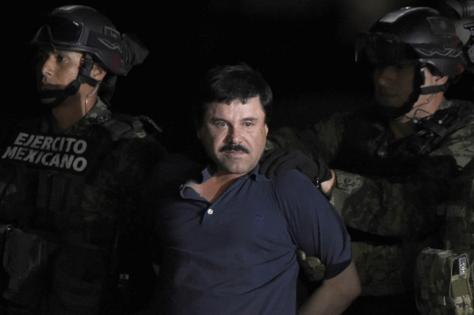Seventeen members of a cartel kingpin's family were escorted into California from Mexico. Why?
Published in News & Features
Key pillars of the Trump administration's policy toward Mexico involve large-scale deportations and a crackdown on cartels.
But reports in the Mexican media suggest that U.S. authorities recently orchestrated the secret, cross-border move of at least 17 relatives of Mexico's most notorious drug kingpin — Joaquín "El Chapo" Guzmán — to California.
Various social media sites have circulated images purporting to show El Chapo's kin lugging rolling suitcases as they waited to enter the United States last week at the San Ysidro border crossing connecting Tijuana and San Diego.
In a radio interview on Tuesday, Omar García Harfuch, Mexico's security chief, confirmed that the move took place.
He characterized the transfer of El Chapo's relatives as part of a "negotiation" between the U.S. Justice Department and representatives of one of El Chapo's sons, Ovidio Guzmán López, who faces drug-smuggling and other charges in federal court in Chicago.
Ovidio Guzmán was initially arrested in 2109 in an operation that sparked gun battles paralyzing the city of Culiacán, prompting then-President Andrés Manuel López Obrador to order him freed in a bid to end the violence. He was rearrested in 2023 in a second bloody operation that left at least 29 dead, including 10 Mexican soldiers. Mexico extradited him to the United States in September 2023 to face drug trafficking charges.
He plans to change his not guilty plea to guilty, according to court papers, but the terms of his potential plea deal remain publicly unknown. A court hearing is set for July 9 in federal court in Chicago.
"As we saw in the news, Ovidio begins a negotiation with the Department of Justice of the United States and it's evident that, [with] his family going to the United States, it's because of that negotiation," García Harfuch told Mexico's Radio Formula.
The current whereabouts of the El Chapo relatives could not be determined. It was not clear if they were under some form of protective custody.
There has been speculation in Mexico that, in exchange for a reduced prison term and other concessions, Ovidio Guzmán could agree to testify for the government in drug cases. Such "cooperation" agreements, experts say, routinely include protection for the relatives of potential witnesses.
Mexican President Claudia Sheinbaum said Monday that the reports had blindsided her — she learned of it from news accounts — and that her government was seeking clarification from Washington.
A Justice Department spokeswoman, Nicole Navas, declined to comment. Ovidio Guzmán's New York-based attorney, Jeffrey Lichtman, did not return messages.
El Chapo, who was convicted in 2019 of running a vast drug network, is serving a life sentence at a so-called supermax prison in Colorado.
The accounts about El Chapo's relatives entering San Diego originated with Luis Chaparro, a Mexican journalist who specializes in stories about the convicted drug trafficker.
On Monday, Chaparro, citing "sources," reported on his YouTube channel that 17 of El Chapo's relatives —including his ex-wife, various nephews and nieces, a grandson, a daughter and a son-in-law — entered U.S. territory in San Ysidro at about mid-day on May 9 and were met by FBI agents. They carried more than $70,000 in cash, reported Chaparro, who said at least one sniper watched over the group as they turned themselves in to U.S. authorities.
Among the group was Griselda López, El Chapo's former wife and the mother of Ovidio and his elder brother, Joaquín Guzmán López, who is also in U.S. custody facing drug charges.
There has been widespread speculation in the Mexican press that Ovidio Guzmán and his elder brother may seek a plea deal and possibly agree to testify against Ismael Zambada García, a co-founder, with El Chapo, of the notorious Sinaloa cartel.
Zambada has said he was kidnapped by Joaquín Guzmán López last summer and flown into the custody of U.S. agents outside El Paso, Texas. Zambada is reportedly in plea negotiations with U.S. authorities to avoid a potential death penalty.
Zambada's arrest has sparked a bloody turf war splitting the Sinaloa cartel. Backers of Zambada are fighting supporters of El Chapo's sons, known as Los Chapitos, for control of the storied criminal organization. Heading Los Chapitos, authorities say, are two of El Chapo's other sons, both wanted men who have remained in Mexico and avoided arrest and possible extradition to the United States.
_____
(Contributing were staff writer Keegan Hamilton in Los Angeles and special correspondents Cecilia Sánchez Vidal and Liliana Nieto del Río in Mexico City.)
©2025 Los Angeles Times. Visit at latimes.com. Distributed by Tribune Content Agency, LLC.







Comments